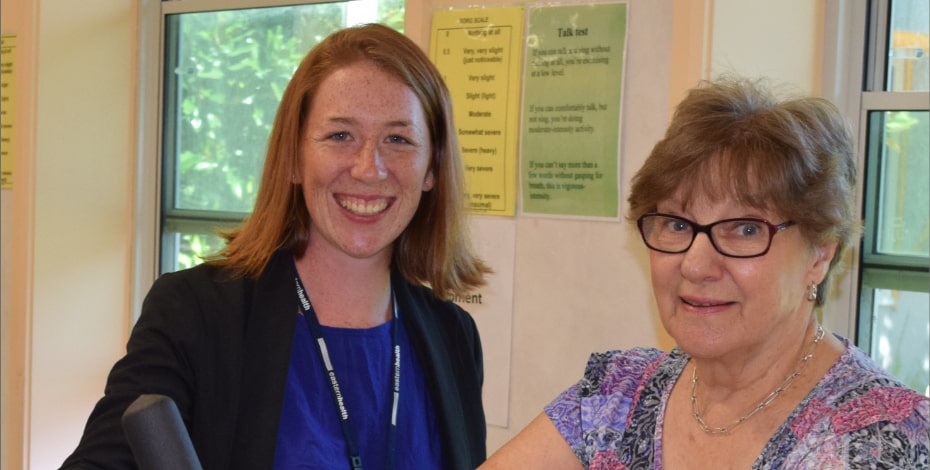
Expanding quality of care

PAT COSH FUND A valuable online resource with a community of practice is set to help physiotherapists prescribe exercise to people with cancer.
For the past decade, clinician and researcher Dr Amy Dennett, APAM, has been helping treat people with cancer and leading the development of oncology rehabilitation programs in Victoria.
An added interest is training physiotherapists in the benefits and delivery of exercise therapy to optimise patient quality of life. In the next 12 months Amy will be developing a website with a community of practice to help her peers prescribe exercise to people with cancer, in accordance with evidence- based recommendations.
Amy’s efforts in developing the website project, called ‘Taking Oncology Rehabilitation Online (TORO)’, recently saw her acknowledged as the 2020 Pat Cosh Trust recipient. She will receive $14,500 to advance her research.
The Pat Cosh Trust has been advancing the education of physiotherapists working or residing in Victoria to provide high-quality care to the general public since 2010, coincidentally the same year Amy first graduated from La Trobe University. It is named after founder fellow of the Australian College of Physiotherapists, Patricia Cosh, and was established with funds bequeathed by the former Physiotherapy Board of Victoria. Since its inception, 18 grants worth over $340,000 have been awarded.
The primary outcome of the TORO project will be a website that offers evidence-based oncology rehabilitation resources that will support physiotherapists with treatment and professional development. It will also provide a professional network with other practising clinicians in the field. Having a website ‘designed by physios for physios’, Amy says, will help facilitate a more rapid translation of existing and emerging clinical practice guidelines into clinical physiotherapy practice.
‘I am interested in the area of enhancing physical activity levels of cancer survivors and the role that hospital-based rehabilitation plays to enhance patient engagement to achieve this goal. I had my eye on the Trust for a couple of years, as its goals aligns nicely with what I am envisaging for physiotherapists to build their confidence and knowledge regarding exercise prescription and progression for patients affected by cancer. To get funding in this platform is vital for this research—it’s great to have the profession investing in me.’
Amy is a long-time member of Eastern Health’s Oncology Rehabilitation Program and considers the oncology field as an ideal area in which to use multiple physiotherapy skills.
‘You treat neurological, musculoskeletal and cardiorespiratory conditions, so you get to use every little bit of physiotherapy combined with cancer treatment. It’s a rewarding and lovely area to work in,’ she says. ‘Some people think it is depressing, but it is completely the opposite, because these people want to do anything to get better.’
Enriching others to treat patients has been a hallmark of Amy’s career. She has taught undergraduate students in chronic disease management and is involved in a collaborative project with Monash University about the skills and confidence of physiotherapists working in oncology. She is also a member of the Victorian APA Cancer, Palliative Care and Lymphoedema committee and sits on the Victorian Exercise and Cancer Advisory panel, and in 2018 completed her PhD examining the role of oncology rehabilitation for increasing physical activity levels of cancer survivors.
She believes the provision of readily accessible online resources with actionable evidence-based guidelines to prescribe exercise for oncology rehabilitation has the potential to empower and enhance the ability of physiotherapists through increased knowledge, skills and confidence. This can only benefit patients, Amy says.
‘Exercise therapy is essential to optimise quality of life in people with cancer and is recommended to be undertaken with the guidance of physiotherapists. While international guidelines specify how exercises should be prescribed, implementation into actual physiotherapy practice is challenging.
‘In developing this project, I realised there is a need for active, practical and engaging resources, as well as learning opportunities for physiotherapists. So, I wanted to put a stamp on our profession that says we do have the expertise in being able to prescribe exercise.’
Evidence-based content and the website will be co-designed with the support of fellow researchers Dr Christian Barton, Dr Catherine Granger, Dr Christian Osadnik and Professor Nick Taylor. It will include information about exercise assessment, prescription and advice on setting up a program. The team will seek endorsement from leading health organisations, such as the APA, Cancer Council, and Clinical Oncology Society of Australia (COSA), of which Amy is a member of its exercise implementation working group.
‘It’s a diverse and knowledgeable team. Through research, we know that incorporating exercise into cancer care improves the lives of people who have it. In 2018, COSA called for exercise to be integrated as part of standard cancer care and for people with cancer to participate in exercise under the guidance of physiotherapists. This is a 12-month project about active and interactive learning that has two key outcomes—produce a publicly available resource that will engage with an audience nationally and internationally, and for this to be a resource that will help physiotherapists increase their confidence and improve their knowledge in treating patients with cancer.’
The team plans to pilot the website mid-year, with evaluation completed by the end of 2020. ‘Hopefully, this will be a valuable tool that will make it easier for physiotherapists to take their exercise program to market, which will also expand the reach and benefits of cancer rehabilitation.’
© Copyright 2025 by Australian Physiotherapy Association. All rights reserved.





